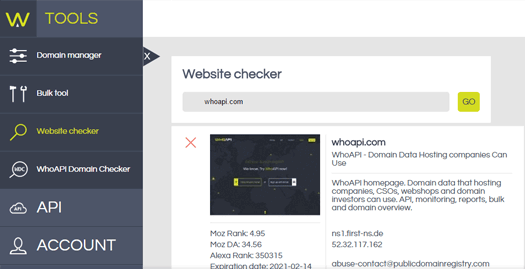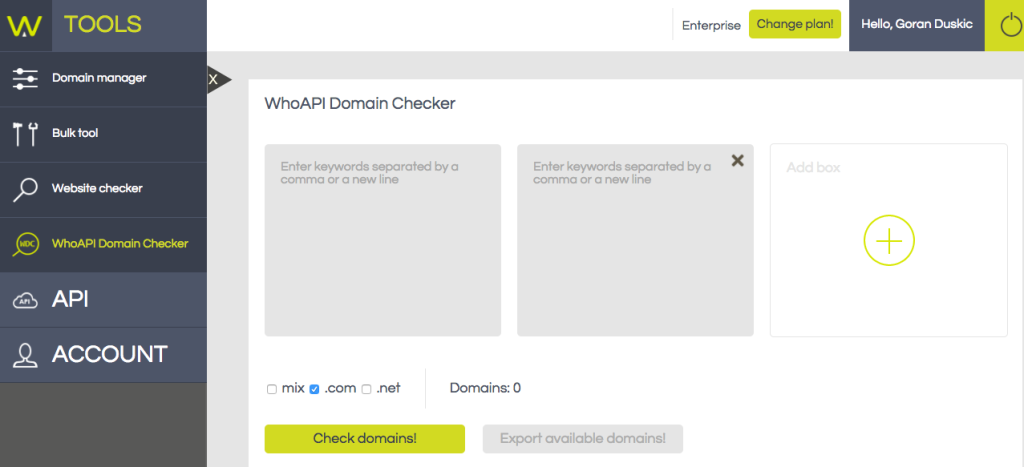This article is sponsored by WhoAPI. Thank you for supporting the partners who make SitePoint possible.
Completing a professional, functional, attractive, award-winning website is not the end of your problems — it’s the start. You must also…
- find a suitable and reliable host
- register a domain and configure DNS entries
- purchase and install Secure Socket Certificates
- configure your server and deploy your site or application
- create and populate databases
- define email addresses and management options.
If everything goes perfectly, your site is live on the web and serving visitors from all over the world. Will it stay that way? Consider what would happen if:
- your site becomes very popular very quickly
- you have a problem with your software stack
- your application exceeds allocated disk space
- your host fails or goes out of business
- there are problems with your domain or certificates
- your site is targeted by unscrupulous entities!
You should be aware of problems before your users, but that’s unlikely unless you’re using your site or app all day, every day. Fortunately, services such as WhoAPI provide robust monitoring facilities which alert you before serious problems occur.
Here are seven ways a monitoring service can help your site and sanity…
1. Ensure Your Domain Name Never Expires
It’s easy to snatch an expired domain. There are several services which do the hard work for you: you enter a domain owned by someone else and a bot will purchase it on your behalf the moment it becomes available.
Domain registrars normally alert you before expiry but there’s no guarantee you’ll receive it. Perhaps you initially signed up with an old email address or the message was marked as spam. Staff in larger organizations may presume domain renewal is someone else’s responsibility and ignore the warnings.

Domain expiries can happen to the biggest and best of us. There are plenty of scare stories such as the time Microsoft forgot to renew hotmail.co.uk.
A good monitoring service will nag you to renew your domain before it expires. The WhoAPI whitepaper provides more information for domain owners.
2. Ensure Your SSL Never Expires
Like domains, SSL certificates are normally renewed every year. Unfortunately, you will not always be warned about expiry and users will be faced with a scary security warning even if there’s nothing inherently wrong or insecure about your site or the technologies it uses.
A good monitoring service will alert you before SSL expiry becomes an emergency.
3. Be Notified of Website Failures
Failures can occur for numerous reasons and any fault can lead to unexpected downtime or usage difficulties. If you’re running a WordPress-powered website you’ve inevitably encountered the dreaded “Error Establishing a Database Connection” page.
You can build fault tolerance into all your systems but it’s difficult to cater for all eventualities and it can only go so far. There’s little you can do to prevent business or hardware-related issues.
Make sure you are the first person to be notified when — not if — a failure occurs.
4. Automatically Backup Your Website Files
I hope I don’t need to remind you about the importance of backups? Unfortunately, the majority of computer users never consider backups until it’s too late and that could include your client or boss. Backups can still go wrong even with a robust archiving strategy…
- your backup script could fail or miss important data
- your webhost could make a mistake or go out of business
- your backup drive could fail at the very moment you need it.
A monitoring service can alert you when backup problems occur. WhoAPI also provide offsite backups — even the smallest plan offers 5GB which is more than enough for most apps and sites.
5. Be Notified About a Loss of Momentum
A number of online tools are available to assess how well your site is performing against others using your domain authority, MozRank and Alexa. You can run these reports on a regular basis to ensure your site is growing — but you’ll soon forget these manual tasks or lose track of what you scored previously.
A good monitoring service can automate the report generation process and alert you when search engine rankings or traffic growth start to fall below acceptable thresholds.
6. Be Notified About Malware
Virus and malware authors want to use your web space so they can host files on legitimate domains. This can be simpler than many site owners realize. If someone breaches an account on your CMS they may be able to use or install plugins which allow direct access to the server’s file system.
There are several ways to prevent attacks and malware appearing…
Stop using a CMS. Prevent uploads. Uninstall git. Remove FTP access. Block shell access. Block visitors. Never launch a website!
More realistically, you should spot malware using a monitoring solution before Google finds any malicious files. Once that occurs, the search engine can block your site and your rank may be negatively affected for a considerable time.
7. Grow Your Online Presence
There are some quick and effective ways to grow your business rapidly:
- research keywords and purchase appropriate new domains
- purchase existing domains which already receive traffic
- discover who your competitors are and offer a better service.
WhoAPI provides a range of research tools including keyword, domain and website checkers. You can generate reports, monitor domain availability and contact owners directly.

WhoAPI provides ad-hoc status reports and automated monitoring for clients in twenty-six countries including King, SendGrid, Site5, Kicbox.io and eWay.
Pricing starts from $92 per year. Can you afford not to use WhoAPI?
Craig is a freelance UK web consultant who built his first page for IE2.0 in 1995. Since that time he's been advocating standards, accessibility, and best-practice HTML5 techniques. He's created enterprise specifications, websites and online applications for companies and organisations including the UK Parliament, the European Parliament, the Department of Energy & Climate Change, Microsoft, and more. He's written more than 1,000 articles for SitePoint and you can find him @craigbuckler.








